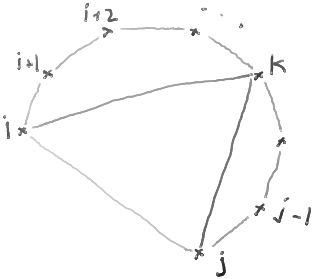Minimum weight triangulation
There are n points {1,2,...,n} arranged on a circle in the plane. You are given n and a matrix of costs cost[i,j], where cost[i,j] is the cost of the line segment connecting point i to point j.
A triangulation T is a collection of line segments connecting the points such that
- none of the line segments in T cross
- the regions defined by the line segments in T are triangles (in other words, no other line segment can be added to T without crossing some line segment in T).
The total cost of the triangulation T is the total cost of the line segments in T.
The goal is to find a triangulation of minimum total cost.
claim: Each triangulation of {1,2,...,n} contains a triangle {1,k,n} for some k in {2,3,...,n-1}
claim: Each triangulation of {1,2,...,n} is formed by the triangle {1,k,n} for some k together with a triangulation of {1,2,...,k} and a triangulation of {k,k+1,...,n}.
More generally:
claim: Each triangulation of {i,i+1,...,j} contains a triangle {i,k,j} for some k in {i+1,i+2,...,j-1}
claim: Each triangulation of {i,i+1,...,j} is formed by the triangle {i,k,j} for some k together with a triangulation of {i,2,...,k} and a triangulation of {k,k+1,...,j}.
picture:
Counting the number of triangles in a triangulation
Using the above claim, we can give a recurrence for the maximum number of triangles in a triangulation of n points:
- N(n) = maxk=2,..,n-1 1+N(k)+N(n-k+1)
- N(2) = 0
This gives N(n) = n-2 (prove by induction).
Counting the number of triangulations
We can also give a recurrence for the number of triangulations of n points:
- N(n) = ∑k=2,..,n-1 N(k)*N(n-k+1)
- N(2) = 1
Finding the minimum cost of any triangulation
claim: The minimum-cost triangulation of {1,2,...,n} is composed of the segment {1,n} together with a minimum-cost triangulation of {1,2,..,k} and a minimum-cost triangulation of {k,k+1,...,n}.
Define T[i,j] = the minimum cost to triangulate {i,i+1,...,j-1,j}.
Then
- T[i,i+1] = cost[i,i+1] (as a degenerate case)
- T[i,i+2] = cost[i,i+1]+cost[i+1,i+2]+cost[i,i+2] and
- T[i,j] = min { cost[i,j] + T[i,k] + T[k,j] : k = i+1,i+2,...,
This recurrence gives an O(n3) algorithm:
1. min_cost_triangulation(i, j, cost, cache)
2. if (j == i+1) return cost[i,i+1]
3. if (j == i+2) return cost[i,i+1]+cost[i+1,i+2]+cost[i,i+2]
4. if ! cache.exists(i,j)
5. cache[i,j] = cost[i,j] + min { T[i,k] + T[k,j] : k = i+1,i+2,...j-1 }
6. return cache[i,j]
The final answer is given by min_cost_triangulation(1, n, cost, cache).
References
- GoodrichAndTomassia problem C-5.11
- DynamicProgramming
